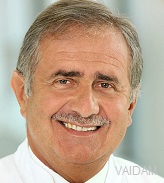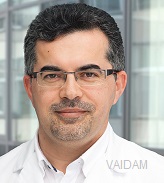Whipple Surgery or procedure is a treatment for disorders and cancers of pancreas, bile duct, intestine and gall bladder. most commonly done for tumourous growth at pancreatic head. it is a difficult procedure in general and can have severe risk related to it. But in cases of cancer it is life saving for people. Also known by the name of pancreaticoduodenectomy as the head of pancreas is removed.
A Whipple procedure may be a treatment option for people whose pancreas, duodenum or bile duct is affected by cancer or other disorder.Its basically done in three ways i.e., open surgery, laparoscopic surgery or robotic assisted which is minimal invasive and there is less blood loss and quick recovery.
A team of specialized surgeons work together and plan the treatment duration, extend and organs involved. In general, the head of the pancreas, initial part of the small intestine also known as duodenum, the gallbladder and the bile duct are removed. In some situations, this procedure may also involve removing a portion of the stomach and the nearby lymph nodes. Post resection, the reconnection of the remaining parts of your pancreas, stomach and intestines is done in order to allow you to digest food normally.
The cost of Whipple Surgery includes:
The overall cost of the procedure also varies based on the patient's condition and preferences. Some of these factors are:
A Surgical Oncologist with a Gastroenterologist is the right doctor for Whipple surgery.
Listing popular specialists:

Chief, 17 years of experience

Endoscopy, Ultrasound and functional diagnosis

Chief, 23 years of experience

Surgical Oncology, Minimal Invasive Surgery, Oncologic Surgery of Upper and Lower GI, Pancreatic and Hepatic Surgery, Esophagus and Stomach Surgery, Colorectal Surgery (malignant and benign), Abdominal Soft Tissue Tumors (Sarcomas), Coloproctology, Endocrine Surgery, Thyroid Surgery, Incisional Hernia Surgery

Director, 37 years of experience

Pancreatic cancer Stomach cancer Pancreatitis Cholelithiasis Ulcerative colitis Cirrhosis Polyps of the gastrointestinal tract Crohn's disease Gastrocele

Chief, 25 years of experience

Gastroenterological endocrinology, Gastroenterological oncology, Intestinal rehabilitation, Malnutrition, Neuroendocrine tumors, Chronic bowel failure, Short bowel syndrome

Prof. Dr. med. Karl-Jurgen Oldhafer
Chief, 33 years of experience

Biliary diseases, Gallbladder tumors, Liver diseases, Cirrhosis

Director, 32 years of experience

Lung cancer Liver cancer Lymphoma Bone cancer Hodgkin's lymphoma Myeloma Testicular cancer Aplastic anemia, Leukemia Acute lymphoblastic leukemia Non-Hodgkin's lymphoma Follicular lymphoma Burkitt"s lymphoma Stomach cancer stage 2 Lung cancer stage 4 Metastases in the liver

Director, 22 years of experience

Larynx cancer Allergology Laser protection

Director, 25 years of experience

Breast cancer Ovarian cancer Cervical cancer

Head of Department, 37 years of experience

Lung Cancer Lung cancer stage 4

Director, 37 years of experience

Lung Cancer Cardiothoracic surgery

Chief, 26 years of experience

Gastroenterology, Hepatology, Gastroenterologic oncology

Prof. Dr. Med. Michael Bartels
Chief, 34 years of experience

Hepatobiliary surgery, Pancreatic surgery, Minimally invasive procedures, Colorectal surgery, Cancer surgery

Head of Department, 25 years of experience

Breast cancer recurrence Radiation therapy with hyperthermia Chemotherapy Anti-hormonal therapy Antibody therapy Mammography MR Mammography

Head of Department, 23 years of experience

Basalioma Dermatoscopy Biopsy Tumour removal Surgical removal of moles and birthmarks Reconstructive surgery using flap surgery Surgical correction of rhinophyma Phimosis

Head of Department, 28 years of experience

Esophageal cancer Liver cancer (Stage 2,3 and 4) Stomach cancer Gastritis Rectal cancer Colon cancer Stomach cancer (Stage 2)

Chief, 31 years of experience

Diagnosis and treatment of breast diseases, Surgical treatment of mammary carcinomas, Oncoplastic breast surgeries, Plastic and reconstructive breast surgery, Colposcopic diagnostics in the lower genital tract

Consultant, 19 years of experience

Colon polyps, Colon cancer, Celiac disease, Hepatitis, Heartburn, or gastroesophageal reflux (GERD), Gallbladder disease, Pancreatitis, Gastroscopy, Colonoscopy, ERCP

Prof. Dr. med. Rainer Duchmann
Director, 22 years of experience

Colonoscopy, Colon polyps and cancer, Hepatitis, Gastroesophageal reflux, Colitis, gallbladder and biliary tract disease, Irritable Bowel Syndrome (IBS), Pancreatitis

Senior Consultant, 18 years of experience

Hepatitis B, Biliary tract disease, Irritable Bowel Syndrome (IBS), Pancreatitis

Chief, 25 years of experience

Internal Medicine, Gastroenterology, Emergency Medicine and Coloproctology.
The five-year survival rate for Whipple's procedure is 25-35%, for case where lymph nodes are not involved. But in case of lymph node involvement the survival chances are very less.
As Whipple Surgery is about the removal of multiple organs, it takes about four hours for the surgery to take place. Recovery takes around 4-5 weeks, chances of long-term survival after a Whipple procedure depend on your particular situation. For most tumors and cancers of the pancreas, the Whipple procedure is the only known remedy.
Our Services for Whipple Surgery in Germany
Transparent - Professional - Without Hassles
Whipple surgery is a procedure being done to remove the head of pancreas the first part of small intestine, the gallbladder and the bile duct.
Whipple surgery is a very difficult and demanding surgery which may carry some risks along with it. This is a life saving surgery mainly for people having cancer.
Yes, whipple surgery is a painful surgery because of the extent of the organs being removed or rearranged and the proximity of the pancreas to nerves as they exit the spine at the back of abdomen during surgery.
Whipple surgery is a treatment option for those patient whose pancreas, duodenum and bile duct are being affected by cancer or any other disorder. The Pancreas is a vital organ which lies in upper abdomen behind the stomach. Whipple procedure is mainly used in the treatment of pancreatic cancer, pancreatic cysts and tumors, pancreatitis, ampullary cancer and bile duct cancer.
The complete procedure of whipple surgery will take around four to twelve hour to complete.
Yes, you will be under general anesthesia for the Whipple procedure, you will not feel any pain during the procedure
In the process of whipple surgery, the surgeon will make an incision in your abdomen to access your internal organs. The location and size of your incision varies according to your surgeon's approach and your particular situation. In some other conditions the whipple procedure may also involve removing a portion of the stomach or the nearby lymph nodes. Other types of pancreatic operations also may be performed, depending on your situation.
In the process of laparoscopic surgery the surgeon will make several small incision in the abdomen region and then laparoscope is inserted which has a camera which transmits the video to a monitor in the operating room and the surgeon watches the monitor to guide the surgical tool.
The long term survival rate of whipple surgery depends on the particular situation such as if a person has tumor and cancer of pancreas the only known treatment is whipple surgery.
It will take about a week to recover from whipple surgery.
The Whipple procedure is a significant surgery. Recovery from the procedure will take some time around one to two weeks.
A Whipple procedure increases your chances of long-term survival with pancreatic cancer. Unfortunately, very few people survive pancreatic cancer.
A Whipple procedure is often the only hope for a cure from pancreatic cancer. However, cure rates depend on the location and stage of your tumor, as well as other individual factors.
Some of the complications of whipple surgery procedure are diabetes, problems with the fistulas, bowel leakage, leakage from the organs involved, bleeding, infection, difficulty during digestion of food, bowel changes, constipation and weight loss.
After surgery you have to be in hospital for about a week under observation so that doctors can monitor you and watch for the chance of complications.
It’s a major surgery and recovery will take time. If there are no complications, you should be able to resume your normal activities in about 4-6 weeks.
The life expectancy of people after whipple surgery is nearly 20 to 25 percent, even if the tumor are removed successfully there are some chances that some cancer cells have already spread to other body parts from where they can form new tumor which can eventually result in death.
Long term side effects of whipple surgery procedures are decreased pancreatic function, diabetes, difficulty in digesting sugary or fatty foods which can cause abdominal pain, tenderness, loss of appetite, weight loss and diarrhea.
Risk of Whipple surgery includes bleeding at surgical area, infection of the incision area, delayed emptying of stomach, leakage from pancreas or bile duct. There can be temporary or permanent diabetes.






NABH Certified Healthcare Discovery Platform
Vaidam is NABH certified healthcare discovery platform that will connect you to top-notch medical experts, hospitals, wellness options, and trusted travel partners to help identify and make the right healthcare choices.

Researched & Personalized Treatment Plan - Under One Roof
You can search for the best hospitals, read about them, view photographs of the facilities at the hospitals and the places at which the hospitals are located, and check the cost of treatment.

Quality Treatment Within Your Budget
As soon as you post an enquiry, the patient relation team will collect details from you, share them with the doctors and hospitals on Vaidam's panel, and get a personalized treatment plan. We research to get quality treatment within your budget.

Treatment to Travel
Vaidam concierge assists patients, to get medical Visa, the best airline fares and arrangements for your stay. Our concierge also helps you with daily travel, language, and food concerns. Vaidam does everything to be your perfect host. All of Vaidam’s services are free of cost to patients.

International Reach
Vaidam Health has network in 15+ countries, which includes India, Turkey, UAE, Germany, South Korea, Thailand, Malaysia, Spain.
Note: Vaidam Health does not provide medical advice, diagnosis or treatment. The services and information offered on www.vaidam.com are intended solely for informational purposes and cannot replace the professional consultation or treatment by a physician. Vaidam Health discourages copying, cloning of its webpages and its content and it will follow the legal procedures to protect its intellectual property